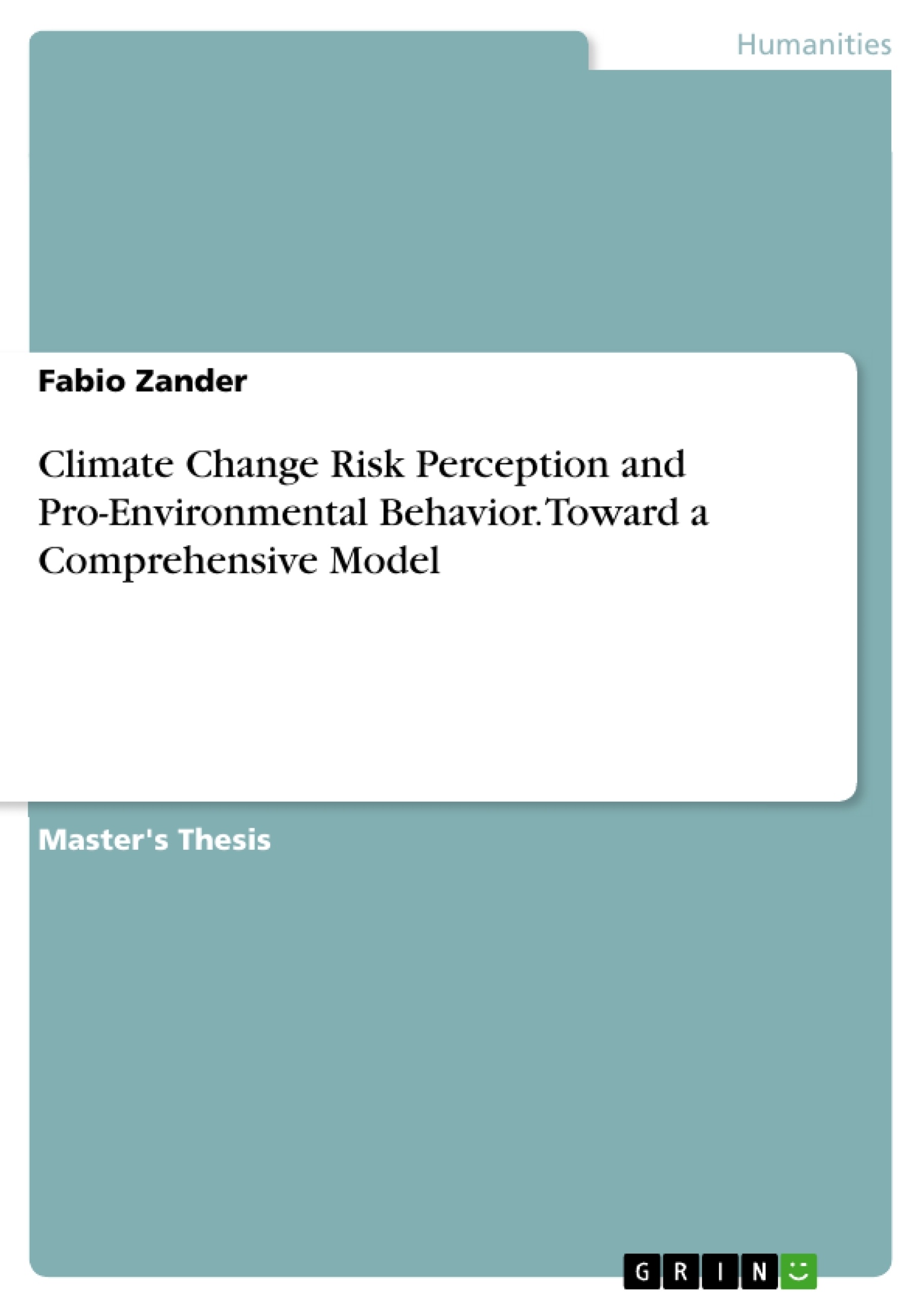Climate change has become one of the greatest concerns of the 21st century as its ramifications pose a major risk to all life on earth. However, not all individuals are aware of this risk and behavioral engagement to counteract the issue is often still lacking. This research examined the relationship between climate change risk perception and pro-environmental behavior. The aim of this cross-sectional study was twofold. First, studying specific pro-environmental behavior and second, using a methodological approach that addresses the measurement inconsistencies in the literature on how to define and operationalize climate change risk perception. The sample consisted of 141 young educated adults (M = 25.67, SD = 2.93) who responded to an online questionnaire. Results showed that climate change risk perception significantly predicted pro-environmental behavior. Comparing personal worry and general concern as two distinct indicators of climate change risk perception indicated that personal worry was stronger correlated to pro-environmental behavior. This relationship was found to be partially mediated by pro-environmental behavioral intentions. Results of a multiple hierarchical regression showed that including personal worry as an additional predictor variable did not significantly increase the explained variance in pro-environmental behavior, after having controlled for variables from the theory of planned behavior (attitude, subjective norms, perceived behavioral control) and the norm-activation model (personal norms). The findings extend the current literature and contribute to a further understanding of why and how humans behave pro-environmentally. Future researchers are encouraged to study the individual drivers of climate change more closely.
Inhaltsverzeichnis (Table of Contents)
- Climate Change and Pro-Environmental Behavior
- Pro-Environmental Behavior
- Climate Change Risk Perception
- Theories on Pro-Environmental Behavior
- Method
- Results
- Discussion
- Conclusion
- References
Zielsetzung und Themenschwerpunkte (Objectives and Key Themes)
This research investigates the relationship between climate change risk perception and pro-environmental behavior. The study aims to analyze specific pro-environmental behaviors and address inconsistencies in defining and operationalizing climate change risk perception in previous research.
- Climate change risk perception as a predictor of pro-environmental behavior
- The role of personal worry and general concern in influencing pro-environmental behavior
- The influence of pro-environmental behavioral intentions on the relationship between climate change risk perception and pro-environmental behavior
- The applicability of theories like the theory of planned behavior and the norm-activation model in explaining pro-environmental behavior
- The importance of understanding individual drivers of pro-environmental behavior to mitigate climate change
Zusammenfassung der Kapitel (Chapter Summaries)
- Climate Change and Pro-Environmental Behavior: This chapter introduces the pressing issue of climate change and its impact on the planet. It highlights the scientific consensus on anthropogenic causes of climate change and emphasizes the need for pro-environmental behavior to mitigate its effects. The chapter also discusses the urgency and complexity of climate change as a global challenge.
- Pro-Environmental Behavior: This chapter explores various definitions and perspectives on pro-environmental behavior. It examines different approaches to categorizing pro-environmental actions, including those based on impact, motives, and domains. The chapter also delves into the growing body of literature on pro-environmental behavior and the need for a more nuanced understanding of its complexities.
- Climate Change Risk Perception: This chapter focuses on the concept of climate change risk perception and its significance in influencing pro-environmental behavior. It discusses different frameworks for understanding risk perception and explores how individuals perceive the threat of climate change. The chapter also examines the influence of personal experiences, values, and social factors on risk perception.
- Theories on Pro-Environmental Behavior: This chapter presents established theories that aim to explain pro-environmental behavior, such as the theory of planned behavior and the norm-activation model. It examines the key constructs within these theories and their potential to predict and understand pro-environmental actions. The chapter also discusses the limitations and strengths of these theories in explaining individual behavior.
Schlüsselwörter (Keywords)
This research focuses on climate change, risk perception, pro-environmental behavior, personal worry, general concern, theory of planned behavior, norm-activation model, and measurement correspondence. The study explores the relationship between these key concepts and their role in understanding and promoting sustainable behavior.
Frequently Asked Questions
Does risk perception predict pro-environmental behavior?
Yes, the research findings show that climate change risk perception significantly predicts pro-environmental behavior among young educated adults.
What is the difference between personal worry and general concern?
Personal worry is a more emotional and individualized form of risk perception, which was found to be more strongly correlated with actual pro-environmental behavior than general concern.
What is the Theory of Planned Behavior (TPB)?
TPB is a psychological model used to predict behavior based on attitudes, subjective norms, and perceived behavioral control.
How do behavioral intentions mediate environmental actions?
The study found that the relationship between risk perception and behavior is partially mediated by behavioral intentions, meaning people must first intend to act before they perform the behavior.
What is the Norm-Activation Model?
It is a theory that explains altruistic and environmental behavior through the activation of personal norms, where individuals feel a moral obligation to act.
- Quote paper
- Fabio Zander (Author), 2018, Climate Change Risk Perception and Pro-Environmental Behavior. Toward a Comprehensive Model, Munich, GRIN Verlag, https://www.grin.com/document/445024



